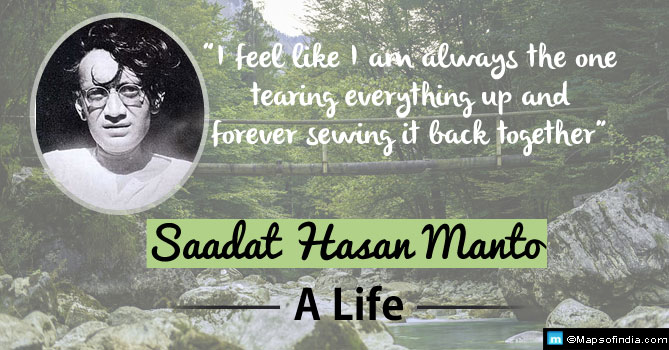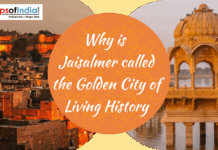“I feel like I am always the one tearing everything up and forever sewing it back together.”
A man way ahead of his time, Manto saw the world as it was – broken and losing to darkness. He never sugarcoated his words, which is perhaps why you would have never found him in the bestselling shelf. That was reserved for the light words, and Manto had no light words to say. He often said that it was not his stories that were dirty, but the society. His stories were merely a reflection. Manto, a movie written and co-directed by Nandita Das, hit the theaters in September, 2018.
While Bollywood pays its own tributes, let’s take a look at the life of this man who never flinched from telling the truth; however unpleasing it might have been.
Manto and his early years
Saadat Hasan Manto was born on 11 May 1912 in Ludhiana district in the British-India Punjab. He came from a family of Muslim barristers, his father a judge in the local court. A man of proud Kashmiri origin, Manto conversed in effortless Punjabi. His entry into the world of literature, one that he transformed radically, can be traced back to 1933, Amritsar. It was there that he met Abdul Bari Alig, a scholar and writer who encouraged him to read notable French and Russian authors. A few months later, the inspired reader had already translated The last day of a condemned man by Victor Hugo.
Soon after, he joined Masawat (a Daily from Ludhiana) as an editor, and went on to pursue graduation from Aligarh Muslim University in the year 1934. Based on the massacre of Jalianwala Bagh, he produced his first short-story “Tamasha”. From then on, he wrote with a ferocity and bare honesty, not known to many. In his life, terribly cut short by alcohol, Manto left behind quite a legacy. He produced 22 collections of short stories, two collections of personal sketches, five radio play series, and three collections of essays.
The man away from Partition
Manto is often considered a writer of ‘partition’. He was an established writer before as well, but it was his work on the heart-wrenching realities of the event that gained wide popularity. He grieved in the wake of partition deeply, having had to leave his love – Bombay behind. But Manto, the man, was a lot more than the partition. He was a man who told true tales in a time when nobody was ready to listen. Nothing stopped the flowing ink of his pen, not even the seclusion. He was charged 6 times for obscenity, his works often considered perverted. But what Manto did was ‘humanize’ the sections of the society that were otherwise looked down upon. His characters were madmen, pimps, prostitutes, unconventional wives – all the people who are either ignored, or considered “polluting” for the society.
For example, Mummy is a short story about an old, empathetic matron in a brothel, generally disliked, or alternatively, misunderstood by the outsiders. Another story, Jhumkey, narrates the tale of adultery by a wife. That was another signature of Manto’s narratives, his liberal outlook towards women. Manto saw the patriarchal society for what it was, and refused to portray or see women as mere submissive members of a family hierarchy, devoid of sexuality and individuality. He insisted on his wife, Safiyah Manto, to call him by his first name, an action that was strictly discouraged in those times.
A lost story
While Manto’s work had carved a name for itself, it never saw the fame it deserved in his living years. He was always on a close call with trouble, and yet not willing to tone his words down. He was expelled from the Progressive Writers Association in 1949. The expulsion came after Urdu Adab, a journal in which Manto mentioned writers from various genres without bias, and Siyah Haashiye. The latter was a book of dark jokes about the horrifying killings of the riots. The book was published in 1948, months after he had moved from Bombay to Lahore, following partition. Manto felt he had been betrayed by his friends, misunderstood; and the partition never really left him.
In his end days, caught in his own sorrows and the whims of alcohol, Manto sold his writings at throwaway prices. But even in the lowest phase of his life, Manto’s words never left their bravery. His last works spoke about the darkness of our world, and of the human mind. Toba Tek Singh, the final legacy that Manto left behind, was published in 1955. The story revolved around madmen being exchanged between India and Pakistan post partition and depicted partition as Manto saw it- madness. In the end of the short story, Bishan Singh, a lunatic, falls to the ground on no man’s land or the “ground that had no name”, not knowing which country had his hometown. It seemed as if in his concluding work, Manto gave his one final cry to the world.
He died on January18, 1955, at a young age of 42. His epitaph, in his own words would have read:
“Here lies buried Saadat Hasan Manto in whose bosom are enshrined all the secrets and art of short story writing. Buried under mounds of earth, even now he is contemplating whether he is a greater short story writer or God.”






